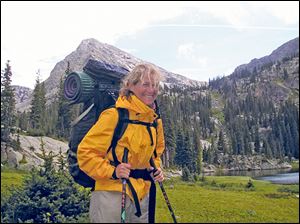
Learning Design programs bring BGSU to students’ desktops
4/29/2014
Living in Colorado didn’t deter Meredith Flynn from earning a graduate degree from Bowling Green State University. The convenience of online programs at BGSU allowed her to reach a goal she had set several years earlier.
Living in Colorado didn’t deter Meredith Flynn from earning a graduate degree from Bowling Green State University. The convenience of online programs at BGSU allowed her to reach a goal she had set several years earlier.
The nontraditional student completed her second BGSU degree last August, when she earned a Master of Education in Learning Design, which focuses on integrating technological management skills into a specific field of interest. Flynn’s first BGSU degree was a doctorate in theater in 1984, when she took and taught classes on campus. For the second degree, the classroom was in her home at the computer.
Senior Master Sgt. Robert Gauthier enrolled in the online Learning Design and Technology bachelor’s degree completion program even though he was nearing the end of his Air Force career and had never been to Bowling Green. The program allowed him to study and take classes when it was convenient for him, and the content of the program aligned well with his training in technology, space and missile systems.
The Learning Design and Technology bachelor’s degree and the Learning Design master’s degree programs welcome a different audience to the BGSU family/community. Both are targeted to individuals who are interested in advancing their careers while continuing to work full time. The programs develop skills that can be applied in most work environments, making the graduates marketable in a variety of industries and segments.
According to Dr. Gary Benjamin, who oversees the two online programs housed in the BGSU College of Technology, Architecture and Applied Engineering, “These programs both address the statewide and national need to help working adults advance their education. About 30 percent of the students in both programs may still live geographically close to Bowling Green, but are working and depend upon the flexibility of online courses. The majority take the classes from places like North Carolina, Texas, Colorado and even overseas.”
When Gauthier decided several years ago to advance his career by completing a bachelor’s degree, he was living in Virginia and working at the Pentagon. Because of the agreement between BGSU and Community College of the Air Force, his CCAF Associate in Applied Science degree was fully transferrable, which made for an easy transition.
He liked that the online classes allowed him the flexibility to work his military job during the day, coach his two sons after work, enjoy family time in the evening and “go to class from about 10 to 11:30 at night,” he said. Additionally, many of the classes, such as Forecasting Technologies, provided valuable lessons about determining demand and consequences of implementing technologies, policies, rules and regulations that “assist me on a daily basis.”
When Flynn began the Learning Design master’s program several years ago, she was employed in BGSU’s Information Technology Services department. She saw the online program as the perfect option to continue learning while working. It ended up being even more ideal when she moved to Colorado in July 2012. Though she was 1,400 miles away from campus, she decided not to abandon the degree, wanting to understand how to develop sound education to reach students today.
“I decided to continue my education, something that would help me in my current job,” she said. “I am a nontraditional student who went through the old system and taught that way as a grad student. I needed to learn the pedagogy for putting classes and training online. It was interesting to be a student to see what works and doesn’t work.”
With the degree in hand, she said, “I do feel prepared. The program gave me a strong foundation, even with technology changing daily.”